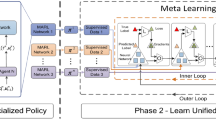Abstract
Multi-agent reinforcement learning has gained great success in many decision-making tasks. However, there are still some challenges such as low efficiency of exploration, significant time consumption, which bring great obstacles for it to be applied in the real world. Incorporating human knowledge into the learning process has been regarded as a promising way to ameliorate these problems. This paper proposes a novel approach to utilize imperfect human knowledge to improve the performance of multi-agent reinforcement learning. We leverage logic rules, which can be seen as a popular form of human knowledge, as part of the action space in reinforcement learning. During the trial-and-error, the value of rules and the original action will be estimated. Logic rules, therefore, can be selected flexibly and efficiently to assist the learning. Moreover, we design a new exploration way, in which rules are preferred to be explored at the early training stage. Finally, we make experimental evaluations and analyses of our approach in challenging StarCraftII micromanagement scenarios. The empirical results show that our approach outperforms the state-of-the-art multi-agent reinforcement learning method, not only in the performance but also in the learning speed.
Access this chapter
Tax calculation will be finalised at checkout
Purchases are for personal use only
Similar content being viewed by others
Notes
References
Ammanabrolu, P., Riedl, M.O.: Playing text-adventure games with graph-based deep reinforcement learning. arXiv preprint arXiv:1812.01628 (2018)
Bougie, N., Ichise, R.: Deep reinforcement learning boosted by external knowledge. In: Proceedings of the 33rd Annual ACM Symposium on Applied Computing, pp. 331–338 (2018)
Bougie12, N., Ichise, R.: Rule-based reinforcement learning augmented by external knowledge
Du, Y., Narasimhan, K.: Task-agnostic dynamics priors for deep reinforcement learning. arXiv preprint arXiv:1905.04819 (2019)
Hester, T., Vecerik, M., et al.: Deep q-learning from demonstrations. In: Thirty-Second AAAI Conference on Artificial Intelligence (2018)
Ho, J., Ermon, S.: Generative adversarial imitation learning. In: Advances in Neural Information Processing Systems, pp. 4565–4573 (2016)
Moreno, D.L., Regueiro, C.V., et al.: Using prior knowledge to improve reinforcement learning in mobile robotics. In: Proceedings of the Towards Autonomous Robotics Systems, University of Essex, UK (2004)
Rashid, T., Samvelyan, M., et al.: QMIX: monotonic value function factorisation for deep multi-agent reinforcement learning. In: Proceedings of the 35th International Conference on Machine Learning, ICML 2018, pp. 4292–4301 (2018)
Sunehag, P., Lever, G., et al.: Value-decomposition networks for cooperative multi-agent learning based on team reward. In: Proceedings of the 17th International Conference on Autonomous Agents and Multiagent Systems, pp. 2085–2087 (2018)
Tan, M.: Multi-agent reinforcement learning: Independent vs. cooperative agents. In: Proceedings of the Tenth International Conference on Machine Learning, pp. 330–337 (1993)
Wang, Z., Taylor, M.E.: Interactive reinforcement learning with dynamic reuse of prior knowledge from human and agent demonstrations. In: Proceedings of the Twenty-Eighth International Joint Conference on Artificial Intelligence, IJCAI 2019, pp. 3820–3827. ijcai.org (2019)
Zhang, G., Li, Y., et al.: Efficient training techniques for multi-agent reinforcement learning in combat tasks. IEEE Access 7, 109301–109310 (2019)
Zhang, H., Gao, Z., et al.: Faster and safer training by embedding high-level knowledge into deep reinforcement learning. arXiv preprint arXiv:1910.09986 (2019)
Author information
Authors and Affiliations
Corresponding authors
Editor information
Editors and Affiliations
Rights and permissions
Copyright information
© 2020 Springer Nature Switzerland AG
About this paper
Cite this paper
Han, X., Tang, H., Li, Y., Kou, G., Liu, L. (2020). Improving Multi-agent Reinforcement Learning with Imperfect Human Knowledge. In: Farkaš, I., Masulli, P., Wermter, S. (eds) Artificial Neural Networks and Machine Learning – ICANN 2020. ICANN 2020. Lecture Notes in Computer Science(), vol 12397. Springer, Cham. https://doi.org/10.1007/978-3-030-61616-8_30
Download citation
DOI: https://doi.org/10.1007/978-3-030-61616-8_30
Published:
Publisher Name: Springer, Cham
Print ISBN: 978-3-030-61615-1
Online ISBN: 978-3-030-61616-8
eBook Packages: Computer ScienceComputer Science (R0)




